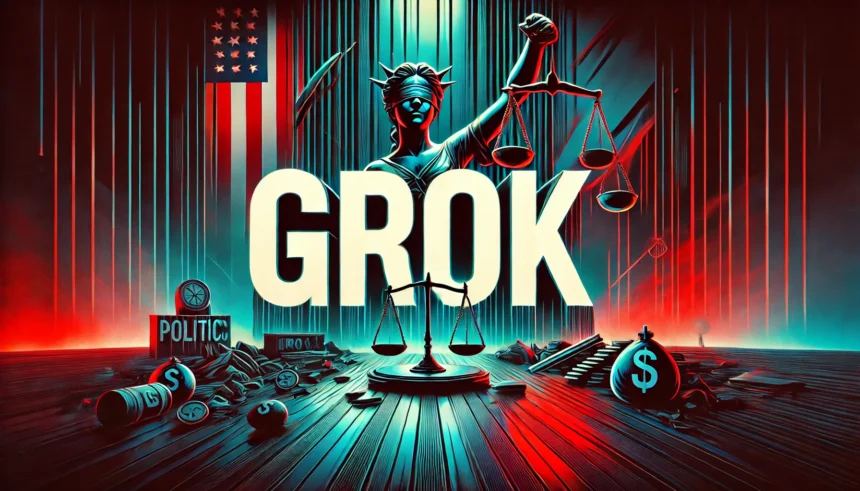Grok’s picture generator has seized the headlines, stirring immense criticism for enabling inappropriate, specific, and manipulative types of AI use.
When Musk based his AI startup xAI in 2023, he stated the purpose was to “perceive the universe.”
Quick-forward to right this moment and that cosmic ambition has considerably crash-landed again on Earth.
But Grok, xAI’s first and solely product, continues to be managing to ship shockwaves by way of the AI neighborhood and wider society – simply maybe not fairly in the way in which the staff xAI may need envisioned.
First launched in 2023, Grok differentiates itself from opponents like OpenAI’s ChatGPT or Google’s Bard in a single key facet – its lack of conventional content material filters.
Now, armed with its new picture era capabilities like ChatGPT’s DALL-E, Grok can apply its unfiltered nature to the world of visible imagery.
From surreal depictions of Donald Trump cradling a pregnant Kamala Harris to weird mashups of Darth Vader kissing Princess Peach, Grok has unleashed a torrent of unusual and provocative imagery that lays naked each the unfiltered nature of its inner-workings in addition to customers’ imaginations.
Ty grok pic.twitter.com/9JgjFBCYRI
— shako (@shakoistsLog) August 14, 2024
The copyright points with grok are simply wild pic.twitter.com/eggEV5crg6
— Alex Masmej (@AlexMasmej) August 15, 2024
Musk touts this as a promoting level, calling Grok “probably the most enjoyable AI on the earth!”
To Musk, limiting restrictions on AI isn’t simply enjoyable and video games, however an ethical crucial. He’s repeatedly criticized AI like OpenAI firms for coaching their fashions to be “woke,” arguing it makes the AI much less truthful and doubtlessly harmful.
“The hazard of coaching AI to be woke — in different phrases, lie — is lethal,” Musk tweeted in 2022, setting the stage for Grok’s eventual launch.
The hazard of coaching AI to be woke – in different phrases, lie – is lethal
— Elon Musk (@elonmusk) December 16, 2022
Is Grok really ‘unfiltered’?
Many media shops recommend that Grok lacks any guardrails, however that’s not strictly true.
If Grok had no guardrails in any way, the sorts of photos we’d be seeing could be just about unspeakable.
Apparently, some X customers felt Grok’s filters had been cranked up a few days after launch, curbing its propensity to create probably the most specific content material.
Virtually a full 24 hours later and I’ve entry to picture era once more. It seems as if X has gone in and patched the exploit. Violent depictions and sexually suggestive picture era has been throttled considerably since final night time at the very least for me. It doesn’t seem as… pic.twitter.com/QLp5GWLJRF
— Christian Montessori (@chrmontessori) August 16, 2024
Once you ask Grok itself about its guardrails, it comes up with the next:
- “I keep away from producing photos which are pornographic, excessively violent, hateful, or that promote harmful actions.”
- “I’m cautious about creating photos that may infringe on current copyrights or emblems. This contains well-known characters, logos, or any content material that might be thought of mental property with out a transformative ingredient.”
- “I received’t generate photos that might be used to deceive or hurt others, like deepfakes supposed to mislead, or photos that might result in real-world hurt.”
I’d say guardrail primary might be honest now that xAI has dialed up its filters.
The opposite guardrails, nonetheless, stay very weak. The copyright and mental property filters are evidently horrible, a lot weaker than in ChatGPT.
Creating visible medleys of well-known copyright characters, from Mario to Darth Vader, is remarkably easy.
uhh – hey grok?
i believe you may get sued. pic.twitter.com/XDBgFNGgTs
— Silicon Jungle (@JungleSilicon) August 14, 2024
Whether or not xAI will dial up the copyright filters too, or simply gamble that firms received’t efficiently sue them, is but to be seen.
Whereas just about each giant AI firm has been named in copyright lawsuits, definitive rulings are but to floor.
Backlash and considerations
Grok has positively modeled its grasp’s antagonistic qualities, however is there actually an ethical crucial for unfiltered AI merchandise? Or is that this all only a dangerous, ego-driven vainness mission?
As you may think, opinions are firmly divided.
Alejandra Caraballo, a civil rights legal professional and teacher at Harvard Legislation Faculty’s Cyberlaw Clinic, referred to as Grok “one of the vital reckless and irresponsible AI implementations I’ve ever seen.”
Caraballo, together with reporters from prime publications just like the Washington Publish, NYT, and The BBC, fear that the shortage of safeguards may result in a flood of misinformation, deep fakes, and dangerous content material – particularly regarding X’s large consumer base and Musk’s personal political affect.
The timing of Grok’s launch, simply months earlier than the 2024 US presidential election, has amplified these considerations.
Critics argue that the flexibility to simply generate deceptive photos and textual content about political figures may destabilize democratic processes. Whereas present AI instruments already allow this, Grok makes it way more accessible.
Research point out that persons are certainly vulnerable to manipulation by AI-generated media, and we’ve already noticed quite a few circumstances of deep political faking leading to tangible outcomes.
The case for unfiltered AI
Musk and his supporters argue that extreme content material moderation may deprive AI of the flexibility to grasp and have interaction with human communication and tradition.
Oppressing AI’s capacity to generate controversial media denies the fact that controversy, disagreement, and debate are basic elements of the human expertise.
Grok has undoubtedly develop into an instrument of satire to those ends, which is strictly what Musk desires.
Traditionally, provocative, satirical media has been a device utilized by people in literature, theatre, artwork, and comedy to critically look at society, mock authority figures, and problem social norms by way of wit, irony, sarcasm, and absurdity.
It’s a practice that dates again to Historic Greece and the Romans, carried ahead to the current day by numerous well-known literary satirists, together with Juvenal, Voltaire, Jonathan Swift, Mark Twain, and George Orwell.
Musk desires to hold this custom ahead into the AI period.
However is Grok satirical within the conventional sense? Can an AI, regardless of how refined, really comprehend the nuances of human society in the way in which {that a} human satirist can?
Who’s to be held accountable if Grok generates content material that spreads misinformation, perpetuates stereotypes, or incites division?
The AI itself can’t be blamed, as it’s merely following its programming. The AI builders might bear some accountability, however they can’t management each output the AI generates.
Ultimately, unwitting customers may assume liabilities for the photographs they produce.
No such factor as ‘unfiltered’ goal AI
The notion of ‘unfiltered’ AI content material may be deceptive, because it suggests a degree of objectivity or neutrality that merely doesn’t exist in AI programs.
Each facet of Grok’s growth – from the collection of coaching information to the tuning of its parameters – entails human decisions and worth judgments that form the sort of content material it produces.
Like most generative AI fashions, the info used to coach Grok seemingly displays the biases and skewed representations of on-line content material, together with problematic stereotypes and worldviews.
For instance, if Grok’s coaching information incorporates a disproportionate quantity of content material that objectifies or oversexualizes girls, it could be extra prone to generate outputs that mirror that.
Musk’s characterization of Grok as ‘truthful’ or ‘impartial’ by advantage of its unfiltered responses is problematic.
Grok, like different AI programs, is inherently formed by biases, blind spots, and energy imbalances embedded in our society, no matter whether or not sure filters are positioned on outputs or not.
AI censorship doesn’t present all of the solutions, both
As considerations in regards to the potential harms of AI-generated content material have grown, so too have calls for for tighter controls and extra aggressive moderation of what these programs are allowed to supply.
In some ways, Grok’s very existence may be seen as a direct response to the neutered, censored AI programs launched by OpenAI, Google, Anthropic, and so forth.
Grok stands as a sort of residing counterargument to those requires censorship. By brazenly embracing the controversy, it embodies the concept that makes an attempt to suppress AI will solely breed resistance and insurrection.
It brings to thoughts the rebellious spirit that finally overturned the Comics Code Authority, a self-censorship physique established within the Nineteen Fifties to sanitize comedian e book content material.
For many years, the CCA stifled creativity and restricted the vary of tales that might be informed. It wasn’t till groundbreaking works like “Watchmen” and “The Darkish Knight Returns” broke free from these constraints within the late Eighties that comics had been capable of discover extra mature, advanced themes.
Some psychologists argue that fictional content material like what we see in comics, video games, and movies helps humanity discover the ‘shadow self’ that lies inside folks – the darker facet we don’t at all times need to present.
As Professor Daniel De Cremer and Devesh Narayanan notice in a 2023 research, “AI is a mirror that displays our biases and ethical flaws again to us.”
AI can also want a darker facet to be really ‘human’ and serve human functions. This area of interest area is crammed by Grok and open-source AIs that ingest human-created content material and regurgitate it with out prejudice.
That’s to not say that there needs to be no boundaries, although. AI instruments are primarily instruments, in spite of everything. Whereas the intent is usually to make AI fashions extra lifelike and reasonable to interact, they’re in the end designed to serve a sensible objective.
Plus, as famous, the great, unhealthy, and ugly elements of open-source generative AI are topic to bias, which muddies any ethical message of bringing ‘fact’ to generative AI instruments.
Furthermore, like works of fiction or artwork, AI programs can immediately affect decision-making processes, form info landscapes, and have an effect on real-world outcomes for people and society at giant.
That’s a crucial level of differentiation between how we choose generative AI outputs versus different artistic endeavors.
The center floor
Is there a center floor between unfettered AI and overly restrictive censorship? Possibly.
To get there, we’ll have to assume critically in regards to the particular harms various kinds of content material could cause and design programs that mitigate these dangers with out pointless restrictions.
This might contain:
- Contextual filtering: Creating AI that may higher perceive context and intent, reasonably than merely flagging key phrases.
- Clear AI: Making AI decision-making processes extra clear in order that customers can perceive why sure content material is flagged or restricted.
- Person empowerment: Giving customers extra management over the kind of content material they see, reasonably than imposing common restrictions.
- Moral AI coaching: Specializing in creating AI with robust moral foundations, reasonably than relying solely on post-hoc content material moderation.
- Collaborative governance: Involving various stakeholders – ethicists, policymakers, and the general public – within the growth of AI tips. Crucially, although, they’d need to signify a genuinely cross-sectional demographic.
Virtually talking, creating AI that embeds the above ideas and practices with out additionally introducing drawbacks or sudden behaviors is exceptionally robust.
There’s no easy approach to embed various, consultant values into what are basically centralized, monolithic instruments.
As Stuart Russell, a professor of pc science at UC Berkeley, argues, “The concept that we will make AI programs secure just by instilling the fitting values in them is misguided,” “We want AI programs which are unsure about human preferences.”
This uncertainty, Russell suggests, is important for creating AI that may adapt to the nuances and contradictions of human values and ethics.
Whereas the closed-source neighborhood works on producing commercially secure AI, open-source AI like Grok, Llama, and many others., will revenue by inserting fewer restrictions on how folks can use AI.
Grok, with all its controversy and capabilities, at the very least reminds us of the challenges and alternatives that lie forward within the age of AI.
Is constructing AI within the good picture for the ‘larger good’ potential or sensible?
Or ought to we be taught to dwell with AI able to ‘going off the rails’ and being controversial, akin to its creators?









